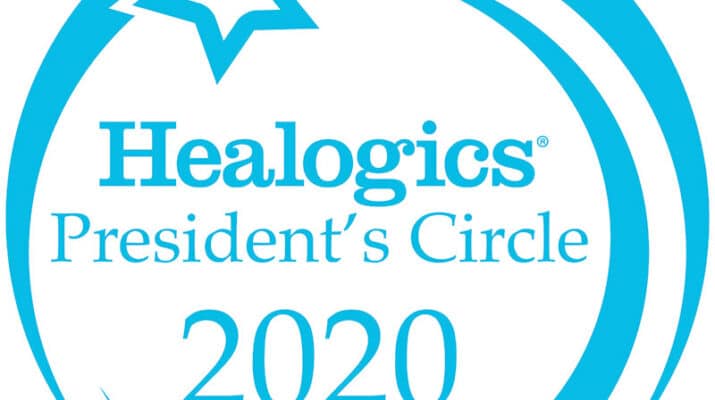Oswego Health physicians, leaders and clinicians recently celebrated the President’s Circle award, which was given to The Center for Wound Healing.
The center along with only 15 others around the country were awarded this prestigious honor by Healogics, the nation’s largest provider of advanced wound care services. The Center for Wound Healing at Oswego Health achieved outstanding clinical outcomes for 12 consecutive months, including patient satisfaction higher than 92%, and a minimum wound healing rate of at least 92% within 28 median days to heal.
The Center for Wound Healing is a member of the Healogics network of over 600 wound care centers and offers highly specialized wound care to patients suffering from diabetic foot ulcers, pressure ulcers, infections, and other chronic wounds which have not healed in a reasonable amount of time.
Advanced wound care modalities provided by wound care experts on staff include negative pressure wound therapy, total contact casting, bio-engineered tissues, biosynthetic dressings and growth factor therapies. The center also offers hyperbaric oxygen therapy, which works by surrounding the patient with 100% oxygen to help progress the healing of the wound.
“Like every other award the center has earned, this award signifies the passion our staff has in providing care for our community,” said Oswego Health Medical Director Carlos Dator, Jr.
Upstate opens second outpatient pharmacy near Community Hospital
After overwhelming success with its downtown outpatient pharmacy, Upstate Medical University has opened a new, additional outpatient pharmacy across from Upstate Community Hospital on Onondaga Hill that will serve more patients and be open to the public.
The new SUNY Upstate Outpatient Pharmacy is located at 5000 W. Seneca Turnpike at the intersection of Broad Road, in the building previously occupied by Syracuse Orthopedic Specialists (SOS). Upstate began leasing the 4,200-square-foot space late last year and has invested more than $2 million in renovations and equipment, and celebrated its grand opening with a ribbon-cutting July 15.
The new pharmacy will support the Meds to Beds program at Upstate Community Hospital, it will handle all of Upstate’s mail order prescriptions and will specialize in compounding, which is the mixing of complex pharmaceuticals in specialized dosages and forms. About 15 people will work in the new facility, which includes a walk-up counter for employees and patients.
The new pharmacy is also home to Upstate’s new pill packaging machine, which produces individualized pill packs based on dosing time (morning, noon, evening and bedtime) that are proving popular and effective for patients. Every hour, the machine can produce 1,200 pouches, which are portioned and labeled for different times of the day. Many patients require four pouches per day meaning the machine can produce monthly packs for about 10 patients per hour. Another new machine provides a high level of quality control by checking up to 2,400 medications per hour to ensure the patient is receiving the correct medication, said Eric Balotin, RPh, director of retail and specialty pharmacy services.
“The pill packs, the Meds to Beds program and many of the other things we’re doing significantly reduce hospital readmission rates related to adverse medication problems,” Balotin said. “We’re hoping to get 300 to 400 patients using the pill packs, which can be mailed directly to our patients. We are trying to keep people out of the hospital and trying to keep them safe from medication adverse effects.”
Balotin noted that the pill packs use symbols and images as instructions, which is helpful in cutting across language barriers.
Upstate opened its first outpatient pharmacy downtown in June 2018. The pharmacy created a highly utilized and efficient Meds to Beds program that ensures patients leave the hospital with critical medications in hand. Today, Upstate’s outpatient pharmacy mails about 2,000 prescriptions per month, personally delivers 600 packages a month and has a staff of 12 insurance authorization specialists and two medication assistance coordinators.
“We have saved patients more than a million dollars on their prescription costs in the last year,” he said. “And we’re on track to do more than that this year.”

